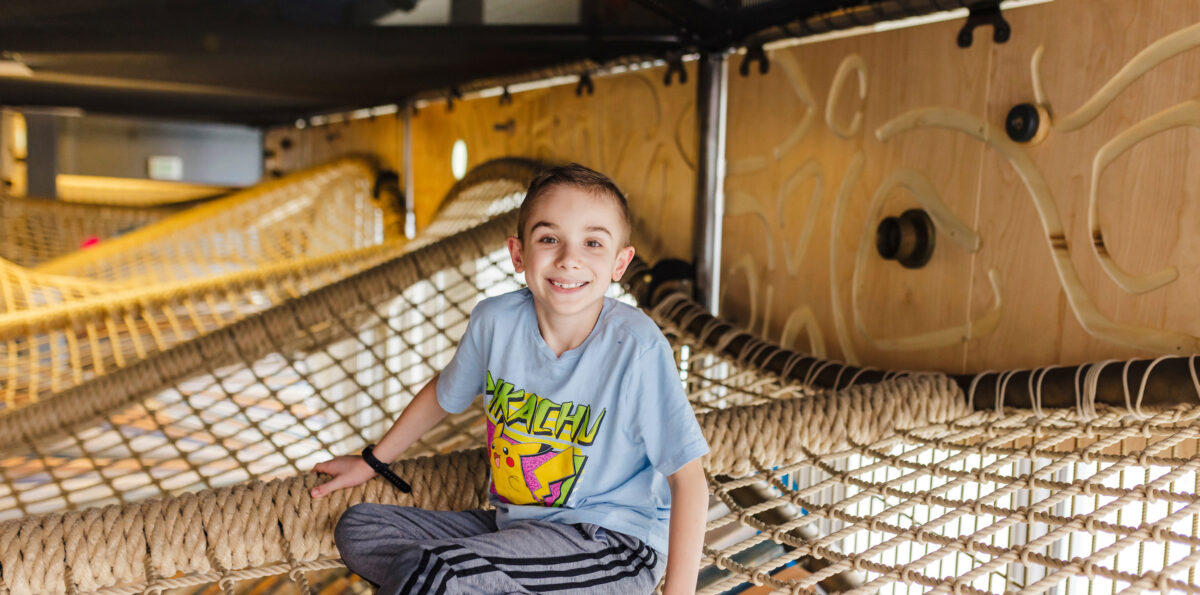Oakley overcomes medical trauma with the help of Mary Bridge Children’s

From the moment 9-year-old Oakley was born, he’s been a fighter. And according to his family, he now fights with a big smile on his face.
Oakley has spina bifida, and most of his visits to Mary Bridge Children’s are for what his mom calls the “waterfall effects” of that condition. Spina bifida affects his brain, development and mobility, as well as his bladder and bowels. Oakley (along with his younger brother, Avery) also has an unidentified genetic condition with its own set of symptoms.
“He’s always happy,” Oakley’s mom Danielle says. “It’s hard to know when he’s not feeling well or he’s in pain, because he always has this positivity about him.”
Unfortunately, this wasn’t always the case. Oakley spent the first years of his life at another medical organization where he developed post-traumatic stress disorder (PTSD), resulting in panic, shaking and screaming during procedures.
Learning tools to overcome trauma
Several years ago, Oakley’s parents switched his care to Mary Bridge Children’s, where he connected with a new care team and could access behavioral health programs. His mom describes the management of his care as “effortless” and his transformation as “significant.”
“When Oakley first started at Mary Bridge, he was at the point that he would scream just seeing an IV cart pushed by,” Danielle explains. “It’s been unbelievable seeing how the teams at Mary Bridge are willing to work with him — they know and remember him. They say, ‘I know you liked this toy last time,’ or ‘I know you liked this game on the iPad.’ Seeing that support allows me to fully trust them. It’s been amazing watching him make the leaps that he has.”
For a kid that visits a doctor, therapist or specialist 10 to 20 times a month and has undergone more than 20 surgeries to date, this work has been essential to Oakley’s health and well-being.
“When it comes to kids who have chronic illnesses, it becomes this thing of just doing, we are just surviving,” Mary Bridge Children’s pediatric psychologist, Becky DeWaay, PsyD says. “Sometimes it can be a really helpful thing if you have somebody come in and just slow things down a little bit and help you find ways to process what’s happening.”
Learning how to process his condition and adding coping techniques to his tool kit has done wonders for Oakley.
“I’m proud of how far he’s come with his trauma,” Danielle says. “I’m also beyond proud of how he’s comprehending what’s going on. He knows his body. He knows where things are located, and he can say, ‘My kidney or headache is on stage three on the pain scale today.’ We use the same pain scale as the hospital. He used to have the same screaming reaction from a one to a 10. Now, he can vocalize it without crying or screaming, which is huge.”
Oakley’s happy place
Oakley and his family live in Port Orchard, which means weekly trips to Tacoma can take a toll. That’s why when Mary Bridge Children’s opened a clinic in Gig Harbor in 2019, thanks to the Mary Bridge Brigade and donor support, Oakley found a new happy place.
“Oakley and Avery go to the Gig Harbor clinic for physical therapy and occupational therapy, as well as for endocrinology appointments and occasionally urgent care and medical rehab,” Danielle says. “Going to Tacoma for four therapies a week isn’t possible, so the new clinic is a lifesaver. The staff do a good job at keeping everybody in their space, so you’re still COVID-safe.”
One of Oakley’s favorite care team members at the Gig Harbor clinic is “Miss Erin” because she makes therapy seem more like play than work. Oakley has bi-weekly occupational therapy appointments to help control his movements and recognize feelings in his body. He also works on sensory processing skills that can affect his attention span, sleep and ability to follow directions
“Oakley is a delight to work with,” Pediatric Occupational Therapist Erin Buzzard says. “He’s so fun and makes me laugh. He’s a very hard worker in therapy and brightens my day. Oakley and I always find fun things to do together to work on different skills like making obstacle courses, playing board games, writing stories and swinging.”
A new Oakley
Today, Oakley is much more comfortable with his treatment and is even calm about being admitted for surgeries, such as his recent procedure to place a shunt in his brain to help with his mobility and headaches.
“He marched into his last surgery explaining he was here to get his head cut open again and was a bit scared but doing well,” Danielle says. “He rattled off his medical chart, allergies, diagnosis everything perfectly.”
His fear has been replaced with confidence, a better ability to cope and excitement at the prospect of playing Pokémon with his child life specialists.
Oakley also has big plans to start golfing and go on more trips outdoors with his siblings and parents as he heals.
As for his mom, she’s been inspired by her oldest child’s perseverance and is currently in a pre-nursing program with dreams of being an MRI tech at — you guessed it — Mary Bridge Children’s.
Many aspects of Oakley’s care, from services in Gig Harbor to help from child life specialists are supported by community donations. You can make a difference in the lives of kids like Oakley with a gift at Mary Bridge Children’s Foundation.